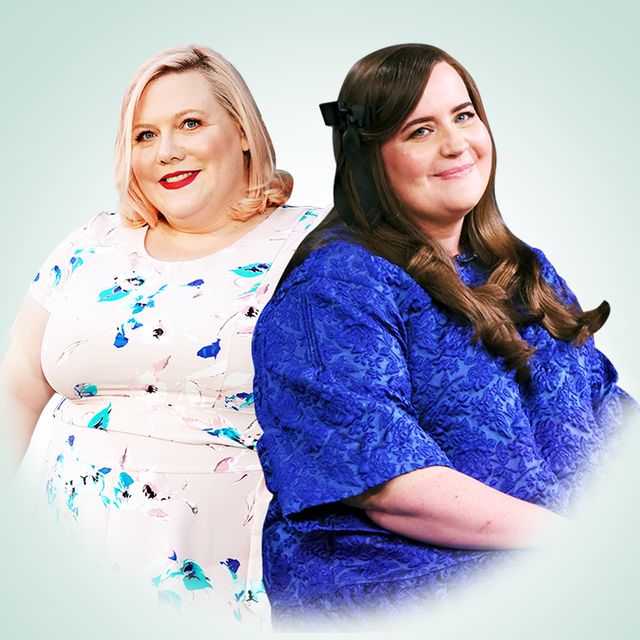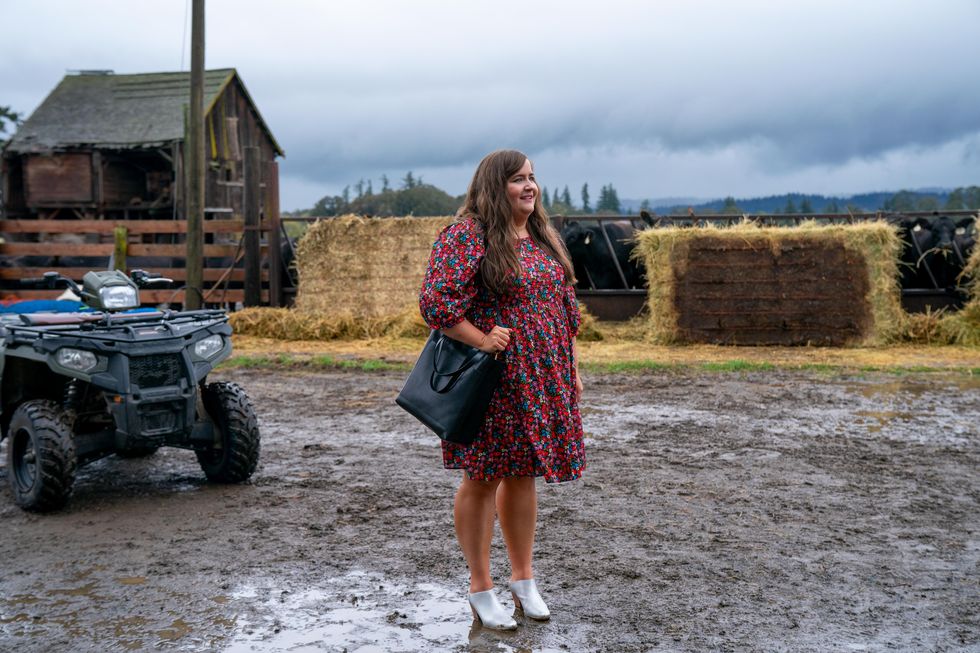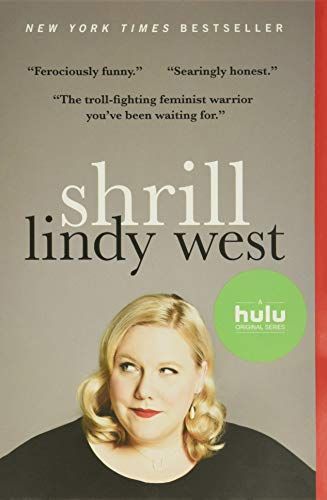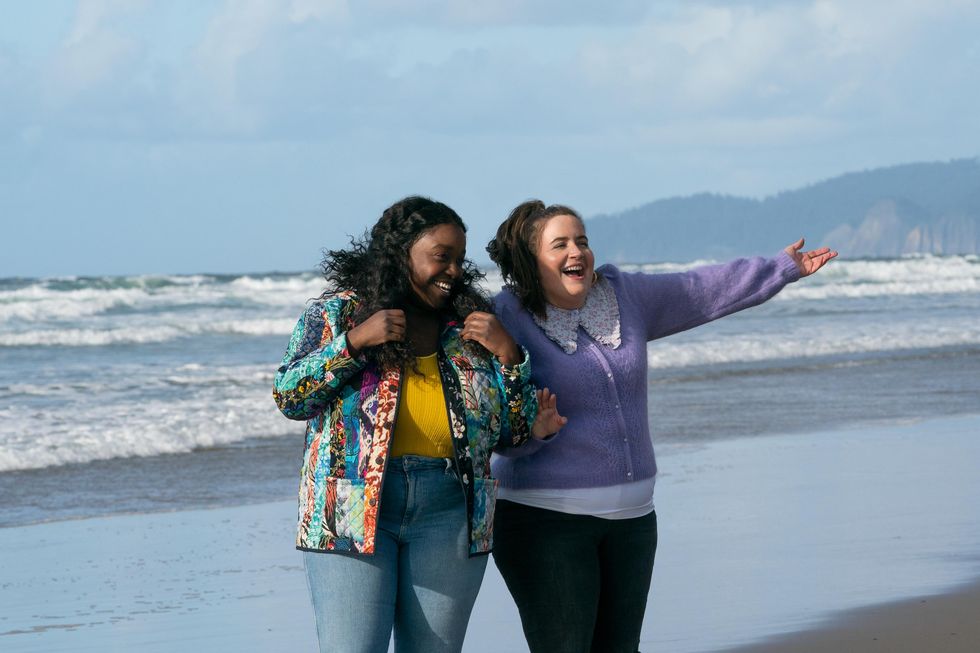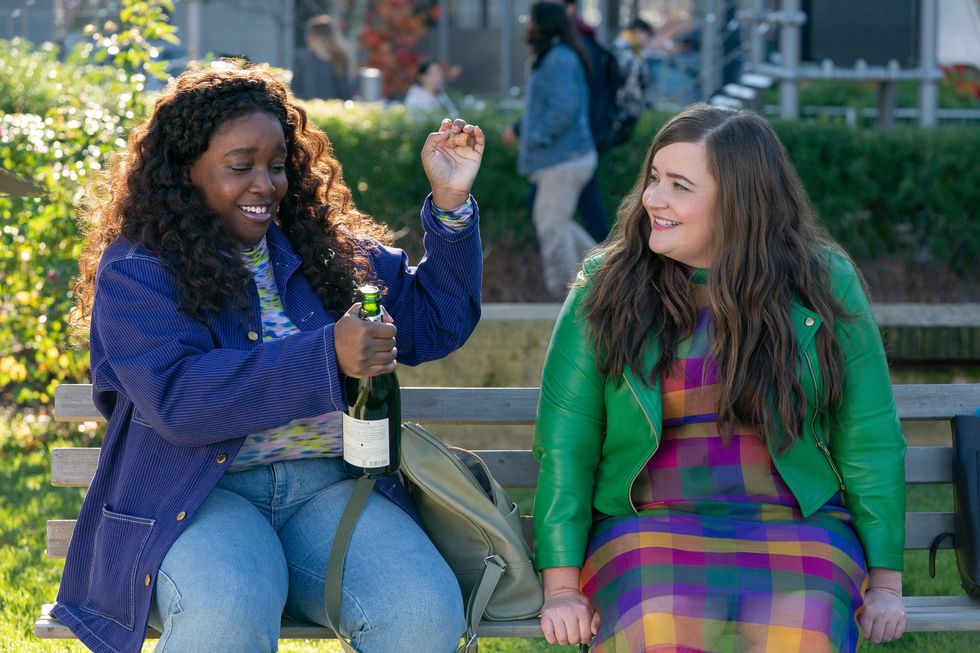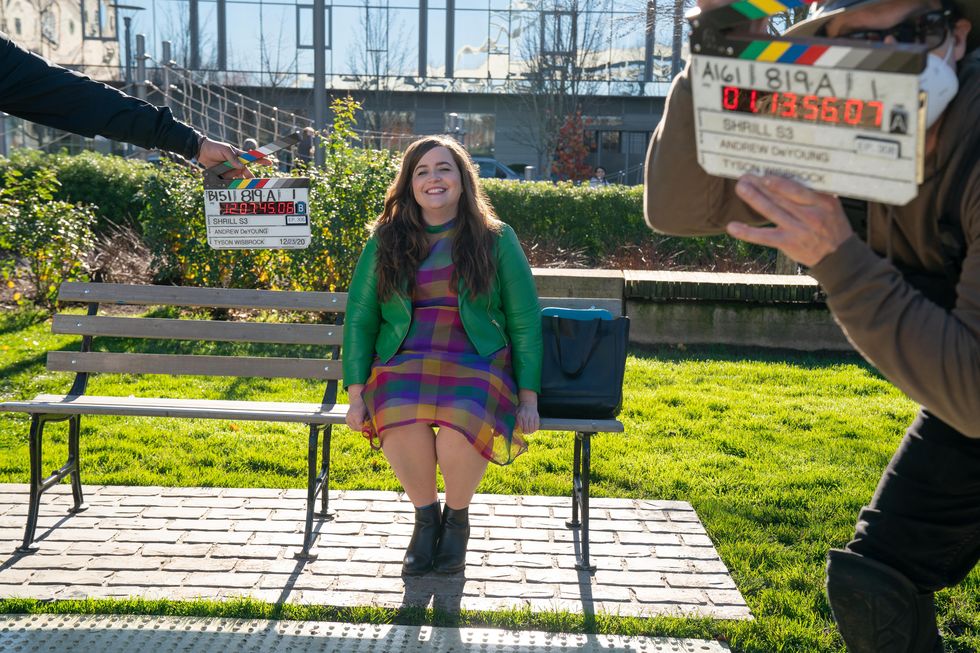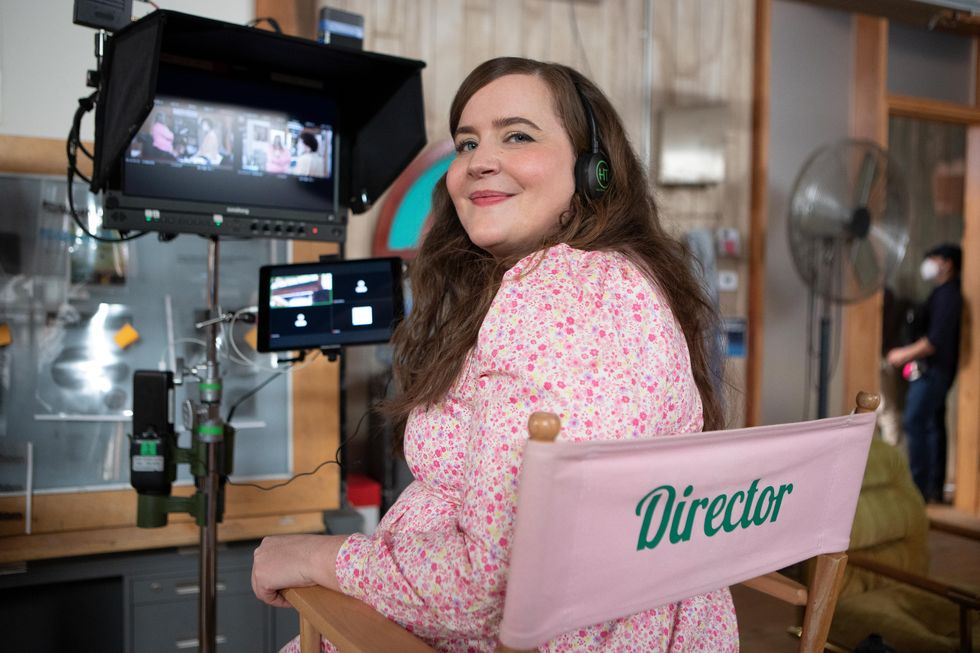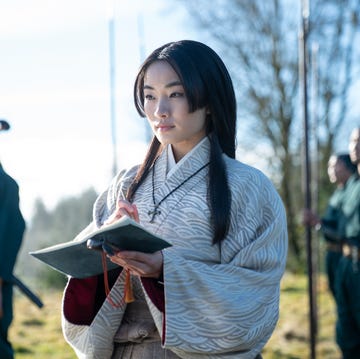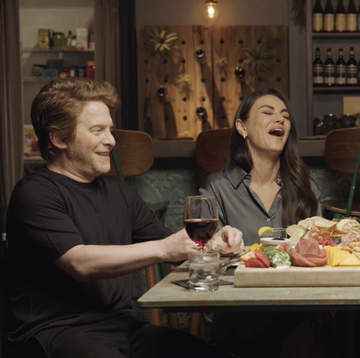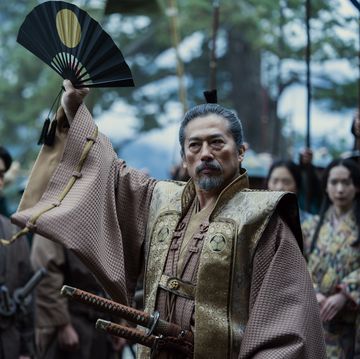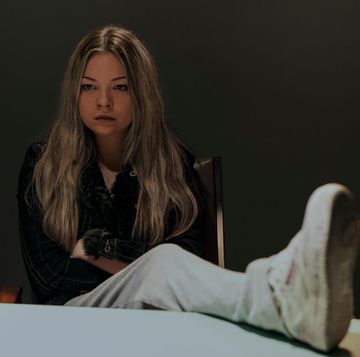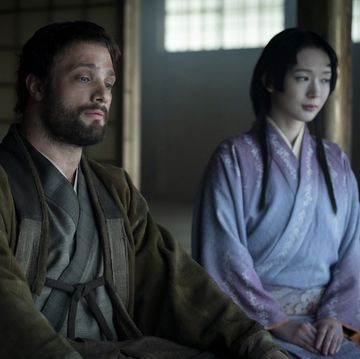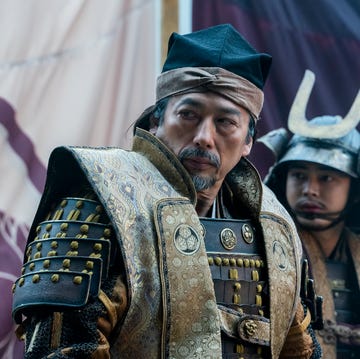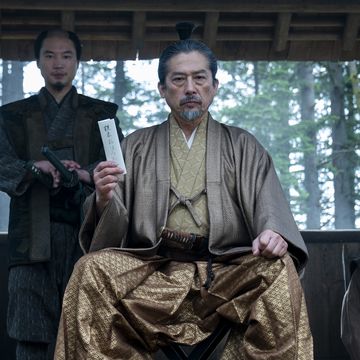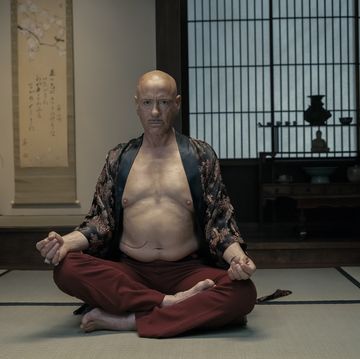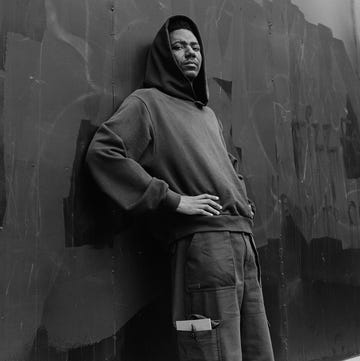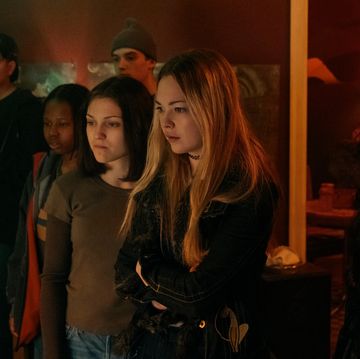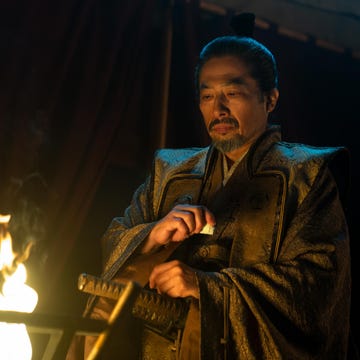In an alternate universe dreamed up by executive producer Lindy West, the series finale of Hulu's Shrill would feature a double wedding—no, a triple wedding, with humans, dogs, and horses alike making their way to the altar. But when news reached Team Shrill that the third season would be the show's last, midway through the process of filming eight episodes in Portland, the season finale soon became the series finale. It doesn't feature a animal wedding, but somehow, it's exactly the right swan song for the groundbreaking comedy about gender, body image, and what it means when women own their power.
Season Three finds Aidy Bryant's Annie Easton newly energized after breaking up with her deadbeat boyfriend in the Season Two finale. Annie is juggling men, balancing new challenges in her work as a journalist at The Thorn, and feeling more liberated than ever, but she hasn't got it all figured out just yet. The final season throws myriad roadblocks in her path—some from external forces, like a fatphobic doctor who recommends weight loss surgery, and some from her own internal compass, still imperfectly calibrated when it comes to negotiating her own white privilege and self-hatred. In one episode, Annie is held to account when her story about a community of white separatists goes viral for all the wrong reasons; in another, she sabotages a blind date with new beau Will, only to realize much later that internalized fatphobia is standing in the way of her own happiness.
"She’s floundering, but she’s growing," West tells Esquire. Bryant and West spoke with Esquire by Zoom about negotiating fatness, finding the right ending, and saying goodbye to Annie.
Esquire: In the first season of the show, we see Annie become more daring; in the second season, we see her follow the momentum of where her new boldness takes her. How would you describe her path during season three?
Lindy West: In Season One, Annie started to identify what she thought she wanted. In Season Two, she overshot and flailed a little bit. Season Three feels like Annie saying, “I’ve got this. I know what I want. I know what I’m doing.” What follows is this very grown-up moment of discovering that nothing is simple; it’s actually a lot harder than she expected. Maybe she doesn't exactly know what she wants, and maybe she's not as evolved as she thought that she was. It’s one thing to get to a point where you're able to say, "I don't hate myself. I have ambitions, and I deserve good things." But that doesn't make you a magically evolved, mature person overnight. It’s a real growing pains kind of season. She’s floundering, but she’s growing.
ESQ: In Season Three, Annie’s career is on the rise. She knows the stories she wants to write and the stories she doesn’t want to write. Her worldview is challenged when she writes a tone-deaf article about a group of white separatists, then receives pushback not just from the internet, but from people of color in her life. Why was that a place you wanted to take Annie?
Aidy Bryant: Part of what we wanted to look at was how focusing on your own journey, your own experience, or your own career goals can blind you to other people’s realities. You think, “I’m here trying to do good—isn’t that enough?” It's actually not. You have to look at the wider world. From a character growth perspective, I like how Annie learns that you’re not always the hero. You're not always the victim in a situation. Annie felt like, “People are pigeonholing me into writing about fat stuff, so that gives me carte blanche to go and do other things.” It doesn't.
LW: I think it's just another manifestation of thinking you're ready and not being ready. Annie’s like, “This is what I want in my career. I want to move into more serious journalism. I want to be taken seriously.” But she doesn't have the life experience and the professional experience to recognize that, fundamentally, maybe she's not the right person to write that story. Even if she could write it responsibly, should she be taking it on at all? It feels very true to life. Annie is confronted with the fact that she’s actually still a new writer, and she doesn't know what she's doing.
ESQ: To your point about growing pains, one of the hardest things about growing up is recognizing when we're wrong, then doing the hard work of apologizing and atoning. It was powerful to see Annie learn those hard lessons in real time.
AB: That’s a place where I feel we only got to show part of what we wanted Annie to do. We had other ideas about next season, where Annie takes on more responsibility at the Thorn. But I do think she’s really listening in a way that she hasn’t been in previous seasons, and that’s a big moment of growth for her.
ESQ: Contrasting Annie’s arc with previous seasons, it was so heartfelt to see her reckon with self-hatred this season. I found her apology to Will so moving, when she says, "I was only thinking about myself and how embarrassed I'd be, that if anyone saw me as part of a pair of fats, they’d think we were together because that's what we deserved.” It struck me in that moment that Annie of Season One wouldn’t have had the self-awareness to get this radically honest with Will. How did Annie of Season Three get to this place?
AB: I'm glad you liked that scene, because I would say that's probably one of my favorite scenes of the whole series. It was really intense to film. That take in particular wasn’t fully scripted. The director said, "Aidy, why don't you do a take that's improvised with these ideas, but put it in your own words?” It was this very visceral feeling. Yes, Annie’s having growing pains, but I think she's also taking almost a bigger step back to look at how her own self-hatred—how it’s turned out onto others, and how it stops her from being happy. I think there's a tragedy in this season that she meets Will in the second episode, but doesn't have that thoughtful conversation with him until the sixth episode. I really loved that it takes her that long to wake up and see her part in her own fatphobia. That’s an internalized feeling that’s really hard to turn off.
LW: It was really important to us to make sure that we weren't putting out this false idea that accepting your body or gaining confidence is a finish line you can ever really cross. It’s a practice. It's an ongoing process that you have to work at every day. On a lot of days, you backslide and fail. We didn’t want to say, “Annie had her little journey in Season One, and now she's a fully actualized person who loves herself every day and never has problems.” She's still super fucked up. I certainly still struggle with my body, and I’ve been talking about my body professionally for a decade. I think it really serves the story beautifully, but it’s also really grounded and really true. She's not a healed person; she's a healing person. That healing is probably going to go on for the rest of her life.
ESQ: I thought it was so rewarding to see her go through the healing with Will—to have that conversation at the beach where they're joking about his swim shirts and the various ways they've each experienced internalized fatphobia. We've seen her discuss her body image with Fran in previous seasons, but to go through it with a male partner is such a departure.
LW: I think men's relationships with their bodies are really under-explored. Men are under-served in that arena. So much body positivity stuff is geared toward women, and I really liked getting to have a fat male character in this season.
AB: I thought it was cool that, in contrast to her other relationships, Annie and Will’s relationship starts on this really raw and honest conversation about how they see themselves and how they see each other. That's their foundation rather than just some bar hookup. It's like the most romantic thing in the world.
ESQ: Toward the end of the show, you go into flashback mode, taking us back to the very beginning of Annie and Fran's friendship. Why did the end of the show feel like the right time to go back to the beginning?
AB: When we were writing and filming this season, we didn't know it would be the end of the show. I wish I could say it was a huge, thoughtful thing we planned, but I do think it panned out naturally. At this point, we're really far away from the Annie of the pilot, where she's super self-conscious and not standing up for herself. I think it's a nice reminder that where Annie and Fran are now is so far from where they started in the pilot, but even further from where they started as a pair of friends. I think it really tees up the true final moments of the series, because it shows how much these two have encouraged each other to find their own confidence, find their own voices, and go after what they want. They did that side by side from a very early point. I think their relationship really is the heartbeat of the show.
ESQ: In the last episode, Fran and Annie wonder if they’re too dependent on each other, and if the intimacy of their friendship is holding them back from experiencing adult intimacy with other people. Where do you come down on that? Are they onto something, or are they all wet?
LW: When I was in my teens and in my twenties, I certainly had codependent relationships with my platonic friends. We couldn’t be apart; we had to talk to each other all day, every day. The dream was just sit in a bed together and watch Alias on DVD seventeen days in a row. I look back on that fondly, not in a toxic way. It's just part of the process. Is any part of the process objectively bad if it's moving you onto the next thing?
Fundamentally, especially given where we ended, even though it was kind of accidental, there's nothing wrong with centering platonic love. It's a really powerful and important thing. It's a deeply vital tether to who you are. I think people can get really lost in romantic relationships; heterosexual women especially are conditioned to erase themselves, and to be what men want them to be. Fran and Annie really hold each other together in a way that’s very grounding. You can tell that the friendship is a touchstone for both of them; it keeps them grounded in who they are, and that’s really important.
AB: I agree with you. I think it’s something all the people in our writers’ room identified with. For me, I had a best friend who I lived with for years in college. We did everything together. The first time I kissed my husband in front of my apartment, I ran into her room and woke her up. She was screaming for me from her bed. Then eventually, I moved in with my boyfriend, and those moments evolved. That doesn’t mean she and I aren’t still friends, but it changes. It changes because you're giving more of yourself to a different person. I don't think it's necessarily like a toxic thing. I think a recalibration or evolution of a friendship.
LW: If anything, I feel the opposite of what Fran and Annie fear. It's not that my friendships held me back from my romance. Now that I'm married, I have to remind myself how to have friends. Life does get so mired in your own household. I just like their friendship so much.
ESQ: Thinking about the intimacy of their friendship brings us to the end of the series. In a way, it strikes me as an ending without end. Annie's journey to confidence, self-love, vulnerability, success—none of that is a finish line she can cross overnight. I like leaving her in the balance. I know you didn’t plan this as the final moment of the series, but what about it seems right and proper as an ending?
AB: In some ways, I’m almost happier with this ending than I would be if we had really planned one. We may have felt self-imposed pressure, or pressure from the network, or that impulse to say, “Pop the champagne bottle! These girls landed perfectly, and everything is great.” That girl boss moment may not have been authentic. Where it lands is a more realistic place, which is, “We’re so much better than we were. We've grown so much, but we still have a lot of growing to do.” Self-worth and self-confidence are not a finish line. It's a balance that changes every day.
I think part of a fat woman's experience that we really captured is that a lot of the time, you're not thinking about the fact that you're fat, but an exterior force reminds you. You’re going to continue to encounter those moments or people who push against your own inner voice. How do you handle it? How does it affect your self-worth? Ending with the two of them together, saying “we still have more to do”—it's a really realistic approach to the series as a whole, to land on that moment.
LW: I'm also really happy with it. I think it's a more interesting and complex place to end than to say, “And for the finale, we’re at Annie and Will’s wedding. Actually, it’s a double wedding—Fran and Em are getting married, too—and Bonkers is marrying the horse.” I’d love that, but it feels much more real this way, as though we’ve winked in and out of these people's lives, because real life doesn't have a narrative arc.
That said, I do think the narrative arc is nice. We end up where we started, which is with this beautiful love between Annie and Fran; that's inspiring and not going anywhere. I also think that not tying everything up with a big bow lets characters keep living in a way that a more formal finale doesn't. You’re just stepping back out of their lives. In my brain, their lives go on, and all of these characters are still out there working at the Thorn. There's something sweet about it.
AB: Even in editing, we asked ourselves, “Should we end on the final moment of them saying something to us?” Or should we end on the moment of them saying, “What do we do now? We just fix everything.” I think we felt exactly what Lindy is saying. We want to keep them going rather than have a beautiful funeral for them.
ESQ: Looking into the future of a post-Shrill TV landscape, what do you hope Shrill's long-term impact will be? What do you hope it makes possible for other shows?
AB: The one thing I’m most proud of, and that I hope becomes more normal, is showing a fat character with a healthy, normal, sexual life, and a dignity in her own sexuality. I feel really proud of that. I hope there's less cartoonish fat sex. It’s been interesting, even doing press for the show. This is a tiny example, but I’ve talked about what happened in the first episode with the doctor and the gastric bypass surgery, which I felt we wrote about in a thoughtful, nuanced way. It’s something that happened to both me and Lindy. I’ve definitely seen that piece of it reduced to headlines like, “Aidy Bryant's Doctors Say She Needs Weight Loss Surgery.” There’s something devastating about that to me, because, wow… we’ve done all this work, and this is still sometimes how fat bodies are talked about. But I’m really hopeful, because we continued to bring this conversation that's been happening for years and years and years to a wider television audience, and even to the entertainment industry itself.
LW: I would also love to see fat actors get roles that aren't about being fat, where it's just a character on a show who has a story. We took a lot of care to make sure that Annie has a much bigger life than just the story about her relationship with her body. Aidy and I have talked about this a lot, just between the two of us. You feel so flattened into this one aspect of your existence, and you don't get to be a full person because you are a fat person first. It’s very, very, very exhausting to not get to be a human being who is more than a body. Even when people are being respectful about your body or sensitive to the dangers of anti-fat medical bias, it’s still centering your body. I dream of a post-fat world.
